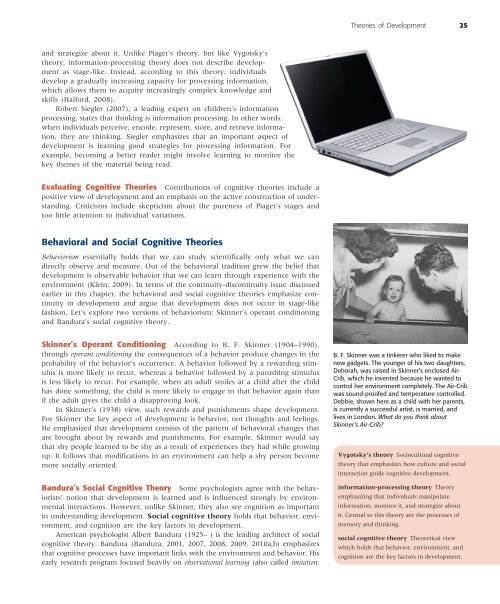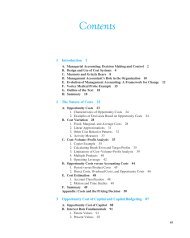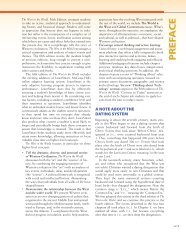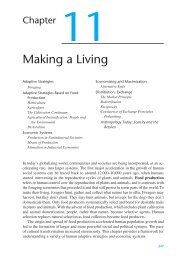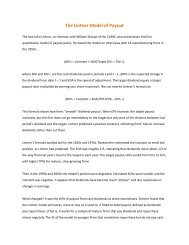Research in Life-Span Development
Research in Life-Span Development
Research in Life-Span Development
You also want an ePaper? Increase the reach of your titles
YUMPU automatically turns print PDFs into web optimized ePapers that Google loves.
and strategize about it. Unlike Piaget’s theory, but like Vygotsky’s<br />
theory, <strong>in</strong>formation-process<strong>in</strong>g theory does not describe development<br />
as stage-like. Instead, accord<strong>in</strong>g to this theory, <strong>in</strong>dividuals<br />
develop a gradually <strong>in</strong>creas<strong>in</strong>g capacity for process<strong>in</strong>g <strong>in</strong>formation,<br />
which allows them to acquire <strong>in</strong>creas<strong>in</strong>gly complex knowledge and<br />
skills (Halford, 2008).<br />
Robert Siegler (2007), a lead<strong>in</strong>g expert on children’s <strong>in</strong>formation<br />
process<strong>in</strong>g, states that th<strong>in</strong>k<strong>in</strong>g is <strong>in</strong>formation process<strong>in</strong>g. In other words,<br />
when <strong>in</strong>dividuals perceive, encode, represent, store, and retrieve <strong>in</strong>formation,<br />
they are th<strong>in</strong>k<strong>in</strong>g. Siegler emphasizes that an important aspect of<br />
development is learn<strong>in</strong>g good strategies for process<strong>in</strong>g <strong>in</strong>formation. For<br />
example, becom<strong>in</strong>g a better reader might <strong>in</strong>volve learn<strong>in</strong>g to monitor the<br />
key themes of the material be<strong>in</strong>g read.<br />
Evaluat<strong>in</strong>g Cognitive Theories Contributions of cognitive theories <strong>in</strong>clude a<br />
positive view of development and an emphasis on the active construction of understand<strong>in</strong>g.<br />
Criticisms <strong>in</strong>clude skepticism about the pureness of Piaget’s stages and<br />
too little attention to <strong>in</strong>dividual variations.<br />
Behavioral and Social Cognitive Theories<br />
Behaviorism essentially holds that we can study scientifi cally only what we can<br />
directly observe and measure. Out of the behavioral tradition grew the belief that<br />
development is observable behavior that we can learn through experience with the<br />
environment (Kle<strong>in</strong>, 2009). In terms of the cont<strong>in</strong>uity-discont<strong>in</strong>uity issue discussed<br />
earlier <strong>in</strong> this chapter, the behavioral and social cognitive theories emphasize cont<strong>in</strong>uity<br />
<strong>in</strong> development and argue that development does not occur <strong>in</strong> stage-like<br />
fashion. Let’s explore two versions of behaviorism: Sk<strong>in</strong>ner’s operant condition<strong>in</strong>g<br />
and Bandura’s social cognitive theory.<br />
Sk<strong>in</strong>ner’s Operant Condition<strong>in</strong>g Accord<strong>in</strong>g to B. F. Sk<strong>in</strong>ner (1904–1990),<br />
through operant condition<strong>in</strong>g the consequences of a behavior produce changes <strong>in</strong> the<br />
probability of the behavior’s occurrence. A behavior followed by a reward<strong>in</strong>g stimulus<br />
is more likely to recur, whereas a behavior followed by a punish<strong>in</strong>g stimulus<br />
is less likely to recur. For example, when an adult smiles at a child after the child<br />
has done someth<strong>in</strong>g, the child is more likely to engage <strong>in</strong> that behavior aga<strong>in</strong> than<br />
if the adult gives the child a disapprov<strong>in</strong>g look.<br />
In Sk<strong>in</strong>ner’s (1938) view, such rewards and punishments shape development.<br />
For Sk<strong>in</strong>ner the key aspect of development is behavior, not thoughts and feel<strong>in</strong>gs.<br />
He emphasized that development consists of the pattern of behavioral changes that<br />
are brought about by rewards and punishments. For example, Sk<strong>in</strong>ner would say<br />
that shy people learned to be shy as a result of experiences they had while grow<strong>in</strong>g<br />
up. It follows that modifi cations <strong>in</strong> an environment can help a shy person become<br />
more socially oriented.<br />
Bandura’s Social Cognitive Theory Some psychologists agree with the behaviorists’<br />
notion that development is learned and is <strong>in</strong>fl uenced strongly by environmental<br />
<strong>in</strong>teractions. However, unlike Sk<strong>in</strong>ner, they also see cognition as important<br />
<strong>in</strong> understand<strong>in</strong>g development. Social cognitive theory holds that behavior, environment,<br />
and cognition are the key factors <strong>in</strong> development.<br />
American psychologist Albert Bandura (1925– ) is the lead<strong>in</strong>g architect of social<br />
cognitive theory. Bandura (Bandura, 2001, 2007, 2008, 2009, 2010a,b) emphasizes<br />
that cognitive proc esses have important l<strong>in</strong>ks with the environment and behavior. His<br />
early research program focused heavily on observational learn<strong>in</strong>g (also called imitation,<br />
Theories of <strong>Development</strong> 25<br />
B. F. Sk<strong>in</strong>ner was a t<strong>in</strong>kerer who liked to make<br />
new gadgets. The younger of his two daughters,<br />
Deborah, was raised <strong>in</strong> Sk<strong>in</strong>ner’s enclosed Air-<br />
Crib, which he <strong>in</strong>vented because he wanted to<br />
control her environment completely. The Air-Crib<br />
was sound-proofed and temperature controlled.<br />
Debbie, shown here as a child with her parents,<br />
is currently a successful artist, is married, and<br />
lives <strong>in</strong> London. What do you th<strong>in</strong>k about<br />
Sk<strong>in</strong>ner’s Air-Crib?<br />
Vygotsky’s theory Sociocultural cognitive<br />
theory that emphasizes how culture and social<br />
<strong>in</strong>teraction guide cognitive development.<br />
<strong>in</strong>formation-process<strong>in</strong>g theory Theory<br />
emphasiz<strong>in</strong>g that <strong>in</strong>dividuals manipulate<br />
<strong>in</strong>formation, monitor it, and strategize about<br />
it. Central to this theory are the processes of<br />
memory and th<strong>in</strong>k<strong>in</strong>g.<br />
social cognitive theory Theoretical view<br />
which holds that behavior, environment, and<br />
cognition are the key factors <strong>in</strong> development.


